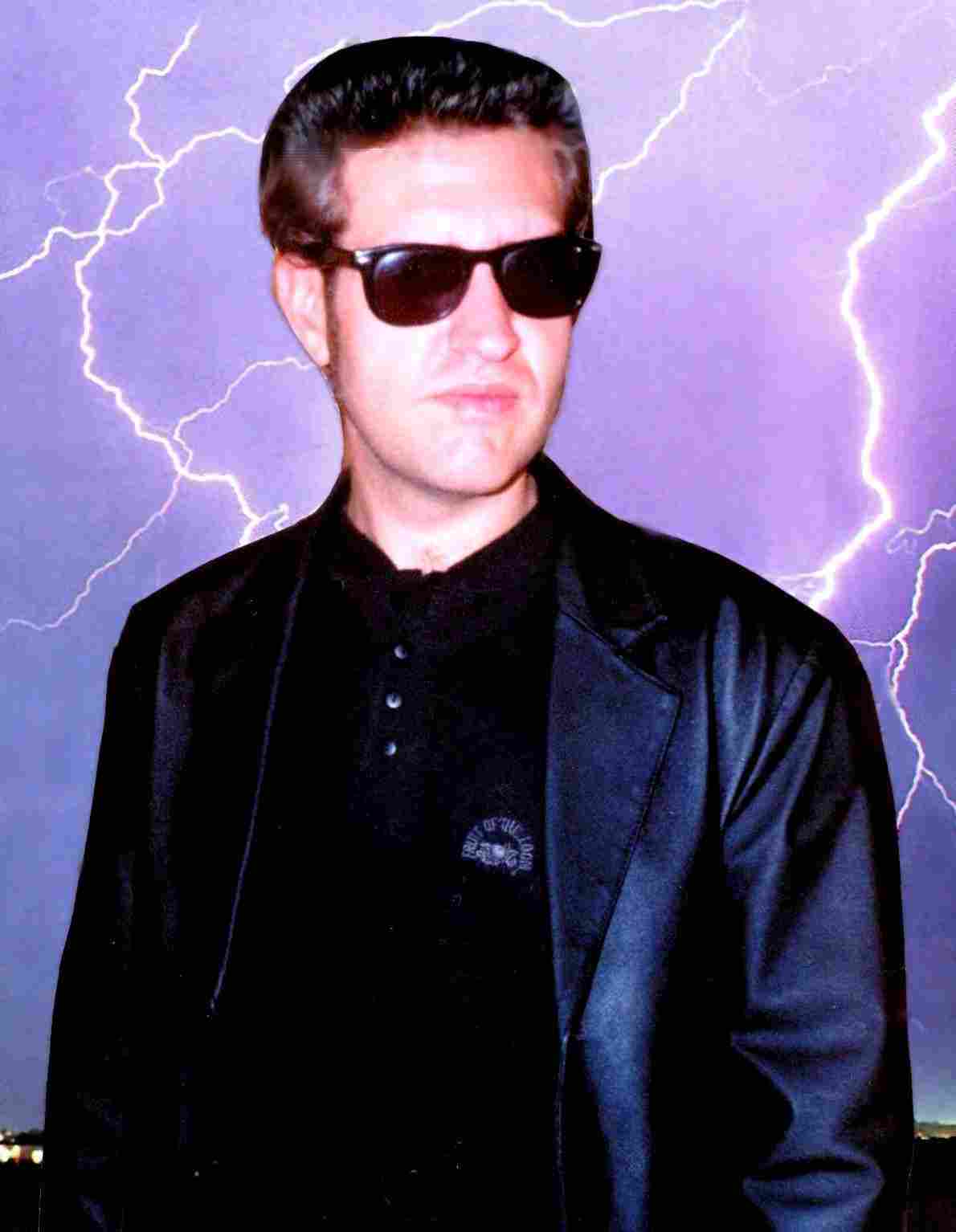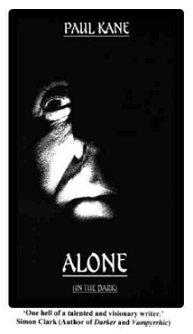
Interview 1
Below is an interview with Paul Kane conducted by Sue Phillips, author of Dowsing and Divining and Healing Stones - first published August 2000.

Sue Phillips: When did you first decide you wanted to be a writer; was there a defining moment when you said to yourself: this is for me?
Paul Kane: I've always enjoyed writing, even when I was at school. For English assignments I was constantly coming up with these strange adventure stories...But I actually wanted to be an artist, or maybe work in the comic book industry. I went to art college for a couple of years and had a fantastic time (I particularly loved photography), but found that I was getting better marks for my theory work than for the practical side of things. An insightful tutor called Eric Popplewell encouraged me to apply for a History of Art, Design and Film course at Sheffield Hallam University where I wrote non-stop for three years. I took a number of journalism units, and so when I left I had a crack at setting up as a freelance writer, doing reviews, articles: the usual kind of thing. Because I'm such a creative person, and I've always got my nose in a book, I suppose it was only a matter of time before non-fiction turned into fiction again. But I never consciously set out to become a writer and I never thought I'd be doing the things I'm doing today.
Sue Phillips: Tell us about the first piece you ever had accepted by a magazine.
Paul Kane: Well, it was the first piece of proper fiction I ever wrote, back in 1998. I'd messed about doing bits and bobs, little scenes and snatches of dialogue (mainly for a writing course I was on at the time), but nothing really seemed to gel. It was relatively easy to write 'The Cave of Lost Souls', though, because it came to me one night in a dream. I remember waking up and having this idea for a complete story - from start to finish - in my head, so I jotted it down, then later began writing the thing. It was all about this cave on the coast somewhere, filled with restless spirits. A suicidal widower finds his way there after his wife dies in a terrible accident, only to discover she's trapped inside the cave. Eventually the wife forces her husband out of his deep depression and helps him understand that if he kills himself they'll never be together again. Consequently she frees both their spirits - her dead soul and his living one. I was in two minds whether or not to send it off to a short story competition (it was only something like 2,000 words), but then saw an advert for Terror Tales print magazine in a writers periodical. I noticed TT was run by this guy called John B. Ford who lived not a stone's throw away from me in Chesterfield. I sent it, he accepted it, and we've been friends ever since. I sometimes wonder what would've happened if I'd entered the competition instead - I'd probably have come nowhere and given up on the whole fiction game.
Sue Phillips: Your collection Alone (In the Dark) hints at a fear of night-time: is this so?
Paul Kane: Oh yeah, definitely (you only have to look at some of my story titles: 'Blackout', 'Shadow Writer' etc, etc). I don't know anyone who actually likes the dark or night-time. I don't care how much they say it doesn't bother them. That's why we used to huddle in caves and light fires when the sun went down. There's something primeval (or just plain evil) about it, something not quite right. I don't like not being able to see what's out there - or what might be out there. But speaking from the perspective of a horror writer as opposed to a Homo sapien, the dark's a superb stimulus for the imagination. The most terrifying thing I can think of is being alone - and I mean utterly alone, like no one else in the world alone - at night. That's the nucleus of the first story in my collection and it's also where the title came from for the book.

Sue Phillips: What inspired you to write this book?
Paul Kane: Not what, but who. Put simply: John B. Ford, again. Right from the start John always said he wanted to do a collection of my work and this was supposed to come a while ago. But then I got word from a publisher in America that they wanted to do a collection too, in trade paperback, using all the stories (and quite a few more besides) that were going to be included in the BJM one. I didn't want to disappoint John because he's been great, so I came up with some new stories for him to use. The individual entries themselves were inspired by any number of different things, ranging from the paintings of Magritte to Louis Armstrong numbers, from Sherlock Holmes stories to Hitchcock's Psycho. There's also a sequel to my most popular piece in there called 'Eye of the Beholder' which I'm very proud of, featuring those meddlesome Controllers again.
Sue Phillips: Did it take very long to complete?
Paul Kane: Off and on, about five months, but I had other projects on the go at the same time (like doing a part-time MA). Basically I'd write a story and send it to John in rough so he could say whether it was suitable or not. It went on like this until finally we had enough for the book. Then it was simply a matter of polishing them up.
Sue Phillips: When you start a new story, what usually comes first: the title or the plot?
Paul Kane: It depends. Sometimes I'll hear a phrase or a word and write it down in my little black notebook (a writer's best mate), then come back to it and work a plot around it. Other times I'll get the idea for a story and then I have to come up with an appropriate title (this is usually much harder). For example, 'The Disease' had several titles before I finally settled on that one - by which time the actual story was almost finished.
Sue Phillips: Do you take your characters from people you know; or are they usually entirely fictional? Have you ever been tempted to put somebody you dislike in as a victim?
Paul Kane: I suppose subconsciously I might include certain character traits (most writers do this), but I never base characters on people I know; that particular road leads to the law courts and bankruptcy. For instance, I've been fortunate enough to encounter a lot of really strong, intelligent women in my time, so when I have to write something with a female protagonist in it I like to make her as resourceful, determined and smart as they are. If the character comes up against something terrible, I might say to myself: well how would so-and-so deal with this? But at the end of the day all characters are composites, amalgamations of people you've known and people you haven't. In answer to your last question, I get on with everybody I meet so I've never had to cross such a bridge. (And if you believe that, you'll believe anything!)
Sue Phillips: You seem to lead quite a busy life, dividing your time between fiction and non-fiction writing. Which do you enjoy most?
Paul Kane: The non-fiction stuff - like the directors book I contributed to, magazine articles and reviews/biographies for TT - is certainly less frustrating. It's just research or reading, and shuffling the facts around or adding some humour to make them more interesting. I find fiction more draining because there are countless ways in which a story might go. As the author, you have to decide which one's the best, and you might not always get it right. Plus you're continually worrying about whether dialogue appears naturalistic, whether characters are coming across as they ought to do, how the reader will react and so on. Having said that, I get infinitely more satisfaction out of writing fiction and enjoy it immensely (does this make me a masochist?), especially if someone has read one of my stories and likes it.
Sue Phillips: How do you see your future as a writer?
Paul Kane: I don't really know how to answer that because it's very hard to plan your future if you're a writer. I don't have the first idea what I'll be doing this time next year and I wouldn't like to hazard a guess. Just like if somebody had told me three or four years ago I'd be meeting bestselling authors like Simon Clark on a regular basis, or interviewing Brian Stableford, or having collections of my fiction published, I'd have laughed them out of the house. So, let's just say I'm hoping my material will be seen by a few more people, that I still enjoy writing it, and that they still enjoy reading a Paul Kane story.
Sue Phillips: When people become writers they tend to have certain aims: fame, money, to get a particular message across, or to externalise a trauma in their lives. What is your personal aim as an author?
Paul Kane: I've never been in it for the money, as my bank manager will testify. I make enough to get by, but that's not why I write. As for the fame bit, I'm a very private person so I'd hate to be a 'celeb' like a Hollywood film star or something. I guess it comes down to this: it's something I feel compelled to do. I could no more stop writing than I could prevent my hair from growing. If it entertains, then so much the better (not my hair, the writing). I do like my stories to have a message, but hopefully I'm not ramming any particular philosophy down people's throats. I externalise traumas all the time, then capture them on the page. It's therapy without the enormous psychiatrist's bill at the end of the session (I was once run over, and you'll spot references to this time and time again in my work). In terms of a personal aim, I want to continue being spontaneous. You never know what you're going to get when you pick up one of my books. I love throwing a curve ball every now and again, and doing humorous or satirical horror (which is where pieces like 'The Bones Brothers' come in); but you're just as likely to get a trip through a surreal landscape or twenty-foot-high monsters on the loose or zombies who respond to flute music. I'd also like to bring more photography and art into my work (which is probably why I agreed to do the cover pictures and illustrations for Alone (In the Dark)). Clive Barker is a big hero of mine and he's combined all his interests brilliantly: he paints, he writes plays, he directs, he does children's fiction. He's flexible, unpredictable, and yet everything he creates belongs in his universe. That's my ultimate goal. I want a universe I can call my own...
(C) Sue Phillips 2000